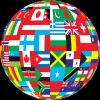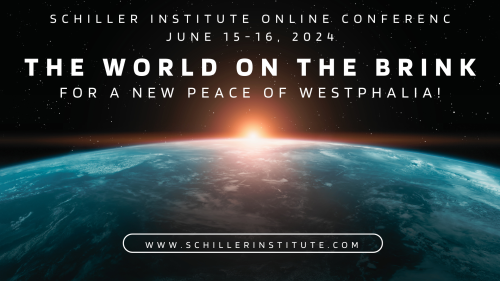Feed
June 16—The international Schiller Institute’s two-day conference, “The World on the Brink: For a New Peace of Westphalia!” got underway June 15 at a time of extreme crisis, and served as a platform for not only review of the nature of the causes of the emergency, but for statements of principles for solutions. The two-day event is organized into four panels, with 23 speakers from 11 countries, and with participation in the question-and-answer sessions from many nations around the world. The full program is posted on the Schiller Institute site, along with the archived video of the entire event. (The transcript of the opening speeches of Panel 1 is available in Documentation.)The opening point raised in the conference invitation was addressed head-on in the first panel: “The collective West’s attempt to assert the global dominance of the neoliberal system after the end of the Cold War has been a resounding failure.” Many different aspects of this were discussed, in particular, the incompetence of Western leaders, their lack of diplomacy, and the fact that last week’s elections for European Parliament was a resounding rejection of the current leading office-holders throughout the EU. The title of Panel I was “Europe after the European Elections.”‘Why Are We on the Verge of World War III?’Schiller Institute founder Helga Zepp-LaRouche, who gave the keynote address June 15, spoke gravely of the present danger, asking, “Why are we on the verge of World War III?” She cited glaring evidence of that, from the recent Ukraine-based strikes on two of the Russian 10 nuclear early warning facilities, and other stark events. But in fact, she stressed, “We are at an end of an epoch,” referring to the end of colonialism and neo-colonialism, a brake on humanity since 1500, and we should be moving ahead. We need a new system, and the good news—blacked out by the Western media—is that, “a new world system is in the process of being built.” She referred to past fundamental, positive shifts promoted by great figures, Germany’s Gottfried Leibniz (1646-1716) and Friedrich List (1789-1846), and China’s Cai Yuanpei (1868-1940). Zepp-LaRouche concluded her keynote remarks, saying, “Let us join the Global Majority.”The other panelists, from the United States, Germany, France, Switzerland, Belarus, and Russia, all concurred on the urgency to act on today’s crises, and had differing points of information and emphasis. Former U.S. Ambassador Chas Freeman, a U.S.-China scholar, led off his remarks simply, “Someone must speak out for peace.”Two spokespersons from Belarus added to what voices for peace have been saying for years from Eurasia. Dr. Olga Lazorkina, Chairwoman of the Foreign Policy Department of the Belarusian Institute of Strategic Research (BISR), spoke of nations “finding common ground,” since we live on one planet. There are as of 2023, some 183 regional conflicts in the world, she said. We must act on alternatives. On the vast Eurasian continent, there are “alternative mechanisms for global economic” development, active regionally, such as the Eurasian Economic Union, which builds upon “friendship and continuity.” Her Belarusian colleague in, Vitaly Romanovsky, Chief Adviser of the Foreign Policy Department of BISR, specifically reviewed the role of Belarus in the peace efforts in recent years over Ukraine.The four speakers on Panel 1 with military backgrounds and associations were very hard-hitting. Col. Alain Corvez (ret.) of France, former adviser to the French Ministry of the Interior, cited Nietzsche to make his point that leading figures in the West are demented. They are in the domain of nihilism, capable of no rational thought. The U.S. is a hegemon failing to recognize that it has lost dominance, so looking for diplomatic relations from them is what makes it so dangerous. Corvez concurred with the conference theme on mobilizing at large for a Peace of Westphalia approach. His compatriot from France, Caroline Galactéros, a political scientist, and colonel in the reserves, called for France to “de-align” from the U.S. and its war-making, and join forces with those promoting stabilization and security. We should “save whatever remains of Ukraine.”From Switzerland, Lt. Col. Robert Bosshard (ret.) gave military details on how “we are in a global stalemate” when it comes to entrenched, terrible situations, as in Ukraine and Gaza. This can and must be shifted.From Germany, Rainer Rupp, military-intelligence expert, who worked directly in NATO from 1977 to 1993, in relation to their periodic simulated nuclear drills called “Wintex” (Winter Exercises), made very clear the mindset he saw firsthand, of U.S., British and other NATO leaders giving no regard at all to the mass casualties at stake within the Europe they claimed to be protecting.‘A Mock Peace of Westphalia II?’The prospect of a positive outcome to today’s crisis was a theme picked up by the speaker from Russia, Georgy Toloraya, Director, Center for Asian Strategy, Institute of Economics of the Russian Academy of Sciences. He gave a brief report on the major speech made June 14 by Russian President Vladimir Putin to top Foreign Ministry leaders, on proposals for Eurasian and global security. This involves the “Global South” and “Global East,” and new configurations in motion such as the BRICS. This past week the BRICS foreign ministers of the original five nations and the four new member nations—Egypt, Iran, Ethiopia, U.A.E., and Saudi Arabia—met together for the first time in Nizhny Novgorod, looking toward what may be “a new stage of action” to benefit the whole world.Zepp-LaRouche recommended during the panel discussion period that we seek out different settings and institutions in which to discuss prospects and principles for ending the crisis. What about at think tanks from all five continents? Or on the level of universities? There is an extreme lack of dialogue, and the NATO narrative is designed to be stifling, blocking any thought and action.She put this on an individual level. Each person should have a vision for himself or herself of what the world should be, and what each one of us can do for that, and make of our lives. “War is an outcome of a deep cultural crisis” in the West. Zepp-LaRouche sees the present period of three to six months as the most dangerous time in history. We need to create a process of dialogue where the best of humanity everywhere is inspired and enlisted to act. The Schiller Institute, and the International Peace Process are dedicated to that.The Global MajorityPanel II, titled, “The Development Aspirations of the Global Majority” featured six speakers, who represented South America, Europe, and Palestine in Southwest Asia. The stage was set by a video excerpt from Lyndon LaRouche speaking 20 years ago at a conference in Germany, May 4, 2001, addressing economic development, in which he focused on, “looking at the possibility of what we can do in Eurasia, and at the needs of Africa.” He presented the idea of development corridors “from the Atlantic to the Pacific,” radiating in all directions, years before the September 13, 2013 launch by Chinese President Xi Jinping of the Belt and Road Initiative.The first panel as well, led off with a video from LaRouche in Virginia on February 20, 2005, warning that there must be a new world economic and security framework organized. He spoke of “the decline and fall of U.S. leadership” 1971 to 2005, citing George Shultz, Paul Volcker, Zbigniew Brzezinski and others.On Panel II from South America, former President of Guyana Donald Ramotar gave both a picture of the economic exploitation, for decades, of his and other nations. Look just at food in the Caribbean. Nations there must spend $4 billion a year on food imports. This all must change, and the rise of the BRICS nations is critical to that. Henry Baldelomar, Professor of International Affairs at Nur University, in Santa Cruz, Bolivia said, “We are now at a crossroads of development for a new order.” The old ECLAC model (UN Economic Commission for Latin America) is too limited for the challenges of real development. Baldelomar spoke of such projects as the new bi-oceanic rail corridor, connecting the Pacific and Atlantic Oceans.In counterpoint to the perspective of growth, reports from Europe presented the picture of needless economic and social breakdown, resulting from destructive policies. Folker Hellmeyer, Chief Economist at Netfonds AG in Germany, in a pre-taped interview by Zepp-LaRouche, titled, “Quo Vadis, Germany?” spoke of such fundamental problems as the lack of energy, and its unaffordability. The harm to imports and exports from sanctions, and much more. Hungarian expert Prof. Dr. Laszlo Ungvari, President (emeritus) of the Wildau University of Technology, spoke of how disappointed he is in Europe, with its degraded politicians in power, and lost young people.Italian economist and China expert Michele Geraci, former Undersecretary of State, Italian Ministry of Economic Development, elaborated on what “win-win” relations among nations would mean for their mutual economic development. He said, “Your prosperity and my prosperity are integral to each other.”From Copenhagen, Palestine Ambassador to Denmark Prof. Dr. Manuel Hassassian began his presentation on the need for Palestinian statehood, by laying out the “LaRouche concept” of development in the Oasis Plan. With a perspective of water, power and all other infrastructure to be made available, there is a basis for the future.The reports and dialogue on this panel were a concrete expression of creative reaction to problems, which came about as if in response to the music which opened the panel. A video was shown of American bass-baritone William Warfield (1920-2002), singing “Die Beiden Grenadiere,” whose text is by Heinrich Heine, and musical setting by Robert Schumann. Instead of the pitiable scene of soldiers dragging themselves home from the Napoleonic wars, going to their graves, seeking some remembrance, we are now called to throw off the imperialism and warfare, and make a world of life and hope.There are two Panels Sunday, June 16: Panel III is titled, “The Implications of the Scientific Revolution Underway.” Panel IV: The Richness of the Cultures of Humanity and the Coming Golden Renaissance."
Reposted Beneath the Floor Boards's news.
The World on the Brink: For a New Peace of Westphalia!Register TodayPanel I: Europe after the European Elections (14:00-17:00 CET; 8 am ET)Moderator, Dennis SpeedHelga Zepp-LaRouche, Schiller Institute founder (Germany)Chas Freeman, U.S.-China scholar, and diplomat (ret.) U.S. Foreign Service (United States)Dr. Olga Lazorkina, Head Foreign Policy Department of Belarusian Institute of Strategic Research (BISR), (Belarus)Prof. Georgy Toloraya, Director, Center for Asian Strategy, Institute of Economics of the Russian Academy of SciencesCaroline Galactéros, political scientist (France)Lt. Col. (ret.) Ralph Bosshard, Swiss Armed Forces; consultant, military-strategic affairs (Switzerland)Volker Tschapke, founder and honorary president of the Prussian Society Berlin-Brandenburg e.V. (Germany)Col. (ret.) Alain Corvez, consultant in international affairs, former advisor to the French Ministry of the Interior (France) Register TodayPanel II: The Development Aspirations of the Global Majority (18.00-21.00 CET; 12 pm ET)Moderator, Dennis SpeedJacques Cheminade, President, Solidarité et Progrès, former French Presidential candidate (France)H.E. Donald Ramotar, former President of Guyana (Guyana)Michele Geraci, former Undersecretary of State, Italian Ministry of Economic Development (Italy)Folker Hellmeyer, Chief Economist of Netfonds AG (Germany)H.E. Ambassador Prof. Dr. Manuel Hassassian, Ambassador of the Palestinian Authority to Denmark (Palestine)Prof. Dr. László Ungvári, President (emeritus) of the Wildau University of Technology (Hungary)Three representatives of the Global South, to be announced SUNDAY, June 16Panel III: The Implications of the Scientific Revolution Underway (14:00-17:00 CET; 8 am ET)Moderator, Claudio CelaniFrancois Mellet, industrial engineer, Director of Operations at Stratek Global (South Africa)Prof. Sergey Pulinets, Principal Research Scientist, Space Research Institute of the Russian Academy of Sciences (Russia)Prof. Gennady Aksenov, S.I. Vavilov Institute for the History of Science and Technology of the Russian Academy of Sciences, Department of the History of Earth Sciences (Russia) Panel IV: The Richness of the Cultures of Humanity and the Coming Golden Renaissance (18.00-21.00 CET; 12 pm ET)Moderator, Megan Dobrodt Jacques Cheminade, President, Solidarité et Progrès, former French Presidential Candidate; “The Culture of Peace” (France) Harley Schlanger, Vice Chairman of the Board of Directors, Schiller Institute-United States; “How Public Opinion Is Manipulated” (Germany)Sophie Tanapura, Maestra soprano, Founder of Metropolitan Opera of Bangkok (Thailand)Karel Vereycken, painter-engraver, art historian, Schiller Institute-France; “Cooperation for the World’s Cultural Heritage: an Important Key for World Peace” (France)Register Today
June 15—The International Peace Coalition (IPC) continued its second year of weekly international online meetings yesterday, with opening comments by Helga Zepp-LaRouche, founder of the Schiller Institute, who reported on the Emergency Press Conference that was held in Washington, D.C. on June 12. She had monitored the responses to the conference, and noted the worldwide concern about the decline of diplomacy, which has been superseded by violence and extortion as instruments of foreign policy.The G7 Summit in Italy and Related FolliesEven Western media have been completely cynical about the recent G7 meeting, held in a luxury resort in Italy’s southern Puglia region. Except for hosting Prime Minister Giorgia Meloni, every participating head of state was a lame duck of one sort or another. The tone of the meeting was uniformly bellicose, and Zepp-LaRouche presented her assessment of the plan to use the interest on frozen Russian financial holdings to leverage a $50 billion bond to arm Ukraine (because confiscating the entire $300 billion in frozen assets would be the “death knell for the financial system”): “This is obviously very good for the pockets of the military-industrial complex,” she said, but “given the fragility of the financial system, all of these things could trigger reactions which are not part of the calculation.” She discussed the almost surreal nature of how the Western media are covering international relations, such as Volodymyr Zelenskyy’s vaunted “Peace Formula” conference in Switzerland, which excludes Russia and therefore can’t possibly work. “You can see how all the news is being twisted,” she said, and stressed the importance of the June 15-16 Schiller Institute conference.Advice for Peace ActivistsPolitical analyst Garland Nixon provocatively asserted that, in a sense, nuclear weapons are already in use; he gave the example of the use of depleted uranium rounds, and urged his listeners to “research Fallujah.” He added that similar weapons were sent to Ukraine, but many were apparently blown up in a weapons depot before they could be used. He told the participants that the ruling elites will not respond to reason, so they must be forced by the masses to act. He referred to “the puppet avatars whom they put out, such as Joe Biden.” He recommended to peace activists that they build a long-term infrastructure for activism, because “they’re planning their next conflict…. This is about getting Russia out of the way, so they can get to China.”Jack Gilroy, a long-time peace activist and member of Pax Christi, described how that organization started in March 1945. He said that the religion of Christianity preaches nonviolence, but regrettably “has become the greatest killer of any religion in the world.” He emphasized the importance of maintaining the intensity of the recent student activism in the U.S., saying that students “may be away from their campuses, but they’re not away from their phones.” He recommended a focus on social media, where there are now 25-30 major platforms. Although there is good work being done on stopping the genocide in Gaza, “even the students are not awake on the issue of nuclear weapons.”Gilroy provided colorful anecdotes from his life of peace activism. He described life as a school teacher during the 1960s, when people were more conscious of the threat posed by nuclear weapons. His young students who participated in “duck and cover” drills knew that these were nonsensical and were offering no real protection; one of his students became so frightened that she swallowed a bottle of aspirin in the restroom and had to be rushed to the hospital. But in those days, at least there was an open channel of communication between the U.S. and the Soviet Union; today we don’t have the red phone, nor any cultural exchange.Disillusioned by the U.S. government, Gilroy’s family moved to Australia, where Jack found himself organizing students to protest French nuclear testing in the Pacific. He later resumed his work in the U.S., where Jack was videotaped dressed as Santa Claus, climbing over the fence at an armaments factory with a bag of gifts for defense workers. He concluded by praising the Schiller Institute’s June 12 emergency press conference and urging the widest possible circulation of its press release.Helga Zepp-LaRouche responded to Garland Nixon by saying that we must convince the people of the U.S. and Europe that the nations of the Global South are our natural allies. If we can work with the BRICS, the Shanghai Cooperation Organization, and related bodies, then there is reason for optimism. She then invited Jack Gilroy to come to Germany and straighten out the wayward Catholics and Protestants there, including many of their top leaders.During the discussion period, one guest who described himself as a “Simple German” reported that he has become remoralized to learn that he has co-thinkers around the world.New York independent congressional candidate Jose Vega gave a report on the Nov. 5 elections. He mentioned that in the Bronx congressional district that borders his own, AIPAC is spending over $11 million in an effort to “primary” Rep. Jamaal Bowman. Vega stressed that he is not endorsing Bowman, who is very wrong on Ukraine, but praised him for taking a stand on Gaza. “Nobody should be allowed to just buy a congressional district.” said Vega. “These elections should be decided by voters, not by people who have deep pockets.”A report came from a German participant who had worked in a senior position for the NATO political affairs division, during which he had participated, beginning in 1979, in the Wintex “crisis management” exercises, which included nuclear war gaming. He reported that each time the scenarios were “gamed,” Europe was always destroyed. He recalled one exercise where an American general was heard to say, “Unfortunately, in the Fulda Gap, the German villages are only half a kiloton away from each other.”A correspondent for Unity News in the U.K. reported that the mainstream media and government all say that soon there will be conscription there, and British youth will go to Ukraine to fight. She said that the majority of Britons have no idea and think that this is a joke. “As independent media, we find it very difficult to speak outside of our bubble … to get any traction,” she said, and she also praised the June 12 press conference.IPC co-moderator Dennis Small recommended that everyone watch the 22-minute exchange between Putin and the St. Petersburg International Economic Forum (SPIEF) moderator Sergey Karaganov on the issue of Russia’s nuclear arms policy. He added that the greatest danger is that if nuclear war proceeds, everything beautiful that humanity has created will disappear. He quoted from Nikolai Ostrovsky’s book, How the Steel Was Tempered: “Man’s dearest possession is his life, and since it is given him but once, he must live so as to feel no regrets for years without purpose; so live as not to be with shame of a cowardly and trivial past.”In her concluding remarks, Helga Zepp-LaRouche underscored the importance of the report given by a German, who had participated in NATO war games in Europe, describing the actual thinking in these nuclear games that Europe does not play a role. “That is absolutely something which people should really come to grips with, because once you realize that you are just a pawn on a chessboard, dispensable to be thrown away, it may alter your servility towards the hegemon.” She added that because nuclear war threatens everyone in the world, “it makes everyone automatically a world citizen.”
June 15—In a speech yesterday before the senior figures of Russia’s Foreign Ministry, comprising Foreign Minister Sergey Lavrov and others of the ministry’s top leadership, President Vladimir Putin delivered a thoroughly composed, powerful review of global and regional affairs, focusing primarily on the historical background and “arrogant and reckless” role played by the West—the U.S. in particular—which led to Russia launching its special military operation (SMO) in Ukraine in February 2022.The conclusion of his speech details his peace proposal for ending the war and restoring relations between Russia and Ukraine and eventually Europe, but he warns that the “self-centeredness and arrogance of Western countries have led us to a highly perilous situation today. We are inching dangerously close to a point of no return.” The “extreme recklessness” of Western leaders who call for a “strategic defeat of Russia” and its dismemberment, “either fail to comprehend the magnitude of the threat they are creating or are simply consumed by their notion of invincibility and exceptionalism. Both scenarios can result in tragedy.”Putin comprehensively discussed a range of international issues—the need for a new global and Eurasian security architecture, how Europe has destroyed itself through its “critical and increasing dependence on the United States,” and the “tragic” results stemming from “NATO diplomacy” being imposed on nations. The U.S. insistence on its imperial status and dominance is “exhausting the country, leading to its degradation, clearly contrary to the genuine interests of the American people.” It is this “dead-end policy, driven by aggressive messianism based on the belief in their own superiority and exceptionalism,” that has kept international relations in a constant state of instability. It didn’t have to be that way, the Russian President emphasized.The emergence of the multipolar and multilateral world order and institutions such as the BRICS and Shanghai Cooperation Organization (SCO) give cause for hope, Putin said. These “system-wide changes certainly inspire optimism and hope, because the establishment of multipolarity and multilateralism in international affairs … make it possible to resolve the most complex problems together for the common benefit and to build mutually beneficial relations and cooperation between sovereign states for the sake of wellbeing and security of peoples.”
June 15—The Washington Post reported June 10 that the U.S. State Department has given the green light for U.S. weapons to be provided, without restriction, to the notorious Azov Brigade, which is now supposedly operating under Ukrainian military command. The Azov Brigade is an openly pro-Nazi militia known for its savagery and brutality, especially against Russian-speaking Ukrainians,Up until now, supplying U.S. weapons to the then Azov Battalion was supposedly banned, as U.S. officials had determined that “some” of Azov’s officers espoused racist, xenophobic, and ultranationalist views, and UN human rights officials had accused the group of humanitarian violations.The alleged ban and the State Department’s “finding” of changed circumstance is laughable nonsense, intelligence sources report. Azov is an openly Nazi formation, whose leaders admit to being followers of the pro-Hitler Stefan Bandera, whose units fought alongside the Nazis during World War II against the Red Army in Ukraine; these sources also claim that the current unit, whose numbers at the start of the current war were in the ten-thousand range, is modelled on the Nazi Waffen SS units that carried out atrocities, including against Ukrainians.The State Department omitted the fairly well known fact that former State Department official Victoria Nuland, sometimes referred to as the “Queen of the Ukraine,” openly solicited help from these Nazis in carrying out her Maidan coup against the duly elected pro-Russian government of Viktor Yanukovych in 2014. Sources report that these Nazis were supplied with U.S. weapons at that time, and were paid handsomely for their services. “The paystubs can be found somewhere,” said a source, disgusted by this latest evidence of the insane incompetence of State. “When ‘Sleepy Joe’ [Biden] was more awake and cognizant, he was aware of this support, just as he was also quite aware that Azov received covert funding from the Ukrainian energy company Burisma, the same outfit that paid both his drug addict son [Hunter] and himself.“Despite the alleged ‘ban,’ Azov has continued to get support from the U.S. and the corrupt funding outlets of the gangsters that run the current government in Kyiv,’ the source continued. “And they have been receiving U.S. weapons. So this report that they are no longer filthy Nazis, while being a lie, merely whitewashes what has been going on without acknowledgement.”Azov is not part of the Ukrainian army but operates as a territorial police unit, similar to the National Guard. Azov and similar militias therefore have a military cover, but keep their own commanders and command structure. And they are still Bandera-ites, even if this is played down slightly. They still sport their swastikas, which apparently the pro-Nazis in the State Department can’t see.“After thorough review, Ukraine’s 12th Special Forces Azov Brigade passed Leahy vetting as carried out by the U.S. Department of State,” the Department said in a statement, referring to the “Leahy Law” that prevents U.S. military assistance from going to foreign units credibly found to have committed major human rights violations. It is named for former Sen. Patrick J. Leahy (D-VT), who wrote the legislation.The State Department found “no evidence” of such violations, its statement says.On Sept. 27, 2023, Azov fighters desecrated the halls of the U.S. Congress, when they were hosted as part of a national tour (during which they sold Nazi insignia and other paraphernalia) by the Congressional leadership, including Rep. Adam Schiff (D-CA) and other members of Congress in both parties. The office of war hawk Senate Majority leader Chuck Schumer (D-NY), who has pushed through billions of dollars for weapons and other support for the pro-Nazi government in Kyiv, claimed that he held no public meetings with Azov.While the Ukraine War lobby in Congress and in State are apparently blind when it comes to seeing Nazis, Russian President Vladimir Putin isn’t. He cited the operations of Azov and other Nazi militias against Russian-speaking citizens of the Ukraine as one of the reasons for the Special Military Operation launched Feb. 22, 2023. Since that time, the Russians have hammered Azov and degraded it, killing thousands of its pro-Nazi fighters.By pouring into Kyiv ever new stocks of U.S. weapons and laundered U.S. funds, a desperate Department of State seems to want Azov to recruit ever more Nazis for terror operations and suicide fighting to throw against the Russians, similar to the way Hitler used what remained of the Waffen SS units in the last days of his losing war.
The World on the Brink: For a New Peace of Westphalia!Register TodayPanel I: Europe after the European Elections (14:00-17:00 CET; 8 am ET)Moderator, Dennis SpeedHelga Zepp-LaRouche, Schiller Institute founder (Germany)Chas Freeman, U.S.-China scholar, and diplomat (ret.) U.S. Foreign Service (United States)Dr. Olga Lazorkina, Head Foreign Policy Department of Belarusian Institute of Strategic Research (BISR), (Belarus)Prof. Georgy Toloraya, Director, Center for Asian Strategy, Institute of Economics of the Russian Academy of SciencesCaroline Galactéros, political scientist (France)Lt. Col. (ret.) Ralph Bosshard, Swiss Armed Forces; consultant, military-strategic affairs (Switzerland)Volker Tschapke, founder and honorary president of the Prussian Society Berlin-Brandenburg e.V. (Germany)Col. (ret.) Alain Corvez, consultant in international affairs, former advisor to the French Ministry of the Interior (France) Register TodayPanel II: The Development Aspirations of the Global Majority (18.00-21.00 CET; 12 pm ET)Moderator, Dennis SpeedJacques Cheminade, President, Solidarité et Progrès, former French Presidential candidate (France)H.E. Donald Ramotar, former President of Guyana (Guyana)Michele Geraci, former Undersecretary of State, Italian Ministry of Economic Development (Italy)Folker Hellmeyer, Chief Economist of Netfonds AG (Germany)H.E. Ambassador Prof. Dr. Manuel Hassassian, Ambassador of the Palestinian Authority to Denmark (Palestine)Prof. Dr. László Ungvári, President (emeritus) of the Wildau University of Technology (Hungary)Three representatives of the Global South, to be announced SUNDAY, June 16Panel III: The Implications of the Scientific Revolution Underway (14:00-17:00 CET; 8 am ET)Moderator, Claudio CelaniFrancois Mellet, industrial engineer, Director of Operations at Stratek Global (South Africa)Prof. Sergey Pulinets, Principal Research Scientist, Space Research Institute of the Russian Academy of Sciences (Russia)Prof. Gennady Aksenov, S.I. Vavilov Institute for the History of Science and Technology of the Russian Academy of Sciences, Department of the History of Earth Sciences (Russia) Panel IV: The Richness of the Cultures of Humanity and the Coming Golden Renaissance (18.00-21.00 CET; 12 pm ET)Moderator, Megan Dobrodt Jacques Cheminade, President, Solidarité et Progrès, former French Presidential Candidate; “The Culture of Peace” (France) Harley Schlanger, Vice Chairman of the Board of Directors, Schiller Institute-United States; “How Public Opinion Is Manipulated” (Germany)Sophie Tanapura, Maestra soprano, Founder of Metropolitan Opera of Bangkok (Thailand)Karel Vereycken, painter-engraver, art historian, Schiller Institute-France; “Cooperation for the World’s Cultural Heritage: an Important Key for World Peace” (France)Register Today















